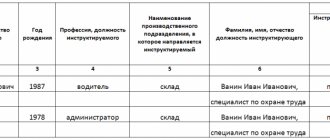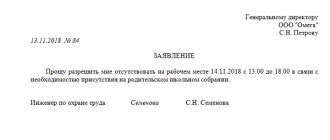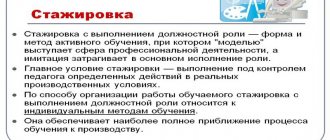The best learning comes from hands-on experience. In working conditions, such a period when theoretical knowledge and skills are “tested” in practice is called “internship”.
- Is it mandatory for every employee?
- How should an employer formalize this process correctly?
- Is it possible to fire an employee due to unsatisfactory results of an internship?
- Should I pay or not pay wages for this period?
Many participants in labor relations confuse the concept of internship with a probationary period and initial instruction. There are many nuances, they need to be clarified.
What is the internship for?
The main point of an internship is that an employee learns directly in the process of his production activities. This period, when both study and activity occur simultaneously, helps the employee to practically master work skills in new conditions. Most often, the need for an internship is obvious in the following situations.
- First job. Yesterday's student received theoretical training in his specialty, but he certainly lacks practical skills due to lack of experience. Under the guidance of an experienced mentor in real working conditions, practical training will take place quickly and effectively.
- Harmful and dangerous conditions. If a person starts working under such working conditions, then he needs a period of supervision by experienced supervisors who will help him orient himself and avoid possible cases of work-related injuries and harm to health.
- Change of workplace . If a person did not change employer, but only a position, for example, moved to another department, received other responsibilities, or even went for a promotion, he will need time to understand the new working conditions. An internship will provide this opportunity.
NOTE! An internship is necessary in any situation when a person starts a new job, regardless of his experience and theoretical training.
What is an internship?
When hired to a new workplace or transferred to another position, the employee must undergo a probationary period. During this period, the employee is closely monitored by the manager. At the end of the internship, the manager makes a decision on hiring the employee for a new position or dismissing him. The testing period is specified in the employment contract.
Law No. 197 (Article 70) contains provisions on passing an employment test. The text of Article 70 reads:
- the employment contract may contain an internship clause;
- if the employment contract does not contain a clause on completing a probationary period, then this means accepting the employee for the position on a permanent basis;
- During the probationary period, the employee is obliged to comply with the norms of Russian labor legislation.
When applying for a job, it is beneficial to include an internship clause in the contract:
- for the employer, the benefit lies in checking the skills, abilities, and responsibilities of a potential employee, which allows him to hire only high-quality personnel;
- for the employee, the benefit is that during the test he will be able to determine whether a given position, company, salary, team, and so on is suitable for him.
Grounds for assigning a probationary period
According to the labor law, when certain categories of citizens are hired, an internship is not established. The rules concern:
- citizens who passed a competition to fill a particular position;
- women with small children under 1.5 years of age;
- pregnant women;
- minors under 18 years of age;
- citizens with higher or secondary vocational education. Provided that the education was received in institutions that have passed state accreditation. Also, this employment is the first job; the job seeker applies for the position within a year after completing the educational process. If more than a year has passed after graduating from an educational institution and a person is applying for a job, then he is not exempt from completing an internship;
- citizens transferred to a new job from another company, taking into account the preliminary agreement of employers;
- employees who have entered into an employment agreement for a period of no more than two months;
- other persons in accordance with the norms of Russian laws.
For the rest of the population, internship is at the discretion of the employer.
How is it paid?
Many citizens are interested in the question of how an internship is paid and is it paid at all? Article 21 of this law specifies the rights of citizens when applying for a new job. One of the paragraphs of this article states that every person, when applying for a job or completing a probationary period, has the right to count on timely payment. According to the law, labor must be paid in accordance with the position held, the qualifications of the employee, the complexity of the work process, the quantity and quality of work performed.
Based on the provisions of this law, we can conclude that internships when applying for a job must be paid in accordance with the law. The probationary period for a new employee can last a long time, so his work must be paid so that the person has funds for his needs.
In accordance with this law, the employer has the right to set lower wages during the probationary period. But the amount paid cannot be lower than the minimum wage established by law (minimum wage).
Maximum term
According to the law, a probationary period is appointed by the decision of the employer (manager). There is no provision in this law (Labor Code) for mandatory internship. If an employer, when hiring employees, establishes a rule regarding the completion of an internship, then the period of completion is also set at his discretion.
Article 70 of this law contains provisions on the maximum duration of an internship. The deadlines are different for management positions and for staff.
By law, the maximum internship period is 6 months for the following positions:
- enterprise managers;
- chief accountants;
- heads of structural divisions;
- heads of branches, representative offices, subsidiaries, etc.;
- deputy managers.
According to the law, for all other positions the maximum internship period is 3 months. The exception is the situation when the employment contract was drawn up for a period of 2-6 months, then the probationary period cannot be more than two weeks.
It is important to know! According to the law, actual absence from work is not taken into account during the internship period. Even if the absence is due to temporary disability.
What does the law say about internships?
The provisions on employee internships are enshrined in the Labor Code of the Russian Federation and related documents. The regulations set out the regulations for internships, as well as the categories of employees for whom this process is mandatory, including the responsibility of the employer. The internship procedure is defined in the following legislative acts:
- Art. 212 of the Labor Code of the Russian Federation;
- Resolution No. 1-29 of the Ministry of Education of January 13, 2003;
- Order No. 37 of Rostechnadzor dated January 29, 2007;
- GOST 12.0.004-90 clause 7.2.4;
- Letter RD-200-RSFSR-12-0071-86-12.
Positive aspects of the internship for both parties
Practical activities under the guidance of a more experienced specialist are of great benefit to both sides of the labor process. Thanks to the internship, the employee :
- acquires or improves practical work skills in his specialty;
- can evaluate himself in the context of new working conditions;
- clarifies the range of his immediate responsibilities and requirements for them;
- joins the team, begins to build relationships with colleagues, superiors or subordinates;
- gently adapts to new working conditions, schedule, workplace, routine requirements and discipline.
Advantages of an internship for an employer :
- compliance with legislation regarding requirements for creating safe working conditions;
- increasing employee efficiency by reinforcing theoretical training with practical skills;
- increasing the level of training and qualifications of employees, and therefore their productivity;
- reducing the risk of harm to health at work;
- direct acquaintance with the employee’s work style, development of management strategy.
ATTENTION! The only negative aspect of an internship can be its incorrect organization, when the employee’s rights are violated or the process is carried out with violations, and therefore ineffective.
How to register correctly
Every employee of the HR department knows how an internship is organized at the workplace when applying for a job. Any actions regarding the hiring, dismissal, and training of employees are fixed by orders.
In this case, you need to prepare:
- order to conduct an internship at the workplace (sample below);
- study program;
- regulations on the internship.
After completion, if the results are positive, an order is issued which allows the employee to begin independent activities.
Responsibility for the development and execution of documents rests with the HR department and the training director.
At the first stage, a draft order is prepared (by personnel). It must comply with the standards of office work and the procedure for its conduct in the organization. Mandatory details that the document must contain:
- full name of the enterprise;
- title of the document, form;
- date of document preparation;
- place of document preparation (city).
Next comes the descriptive part. It sets out the normative acts on the basis of which it is carried out, its goals, approves those responsible, and sets a specific training period. The position for which the employee is being hired must be specified.
The internship regulations must be prepared by the HR department in advance. This is a general document regulating the procedure for conducting training in general. It is approved by the head of the company. It provides the following sections:
- general provisions regarding the organization of the process;
- regulations and training procedures;
- responsibilities of responsible persons and employees;
- the procedure for conducting tests and granting access to independent work.
The internship program is prepared by the immediate supervisor of training. This is a detailed document that describes the plan and stages of acquiring skills.
The program is approved by order of the head of the organization . Contains main points:
- the purpose of the training;
- requirements for a future employee;
- regulatory framework for study;
- official regulations of the department;
- activities during which the material will be mastered;
- application of practical skills, actual activities under supervision;
- testing knowledge, conducting tests to obtain admission.
Each item requires specific dates and deadlines. Initially, the minimum required is indicated, but can be adjusted depending on the circumstances. The internship director also keeps a special journal in which he notes all the stages completed and the time spent. All its points must coincide with the compiled program.
For whom an internship is inevitable?
The law talks about mandatory internships for certain categories of people just starting work. These include:
- Young professionals;
- employees who came to work in harmful and/or dangerous conditions;
- operators of technological and/or industrial installations;
- drivers of public transport (minibuses, trolleybuses, trams, buses).
IMPORTANT! For other categories of employees, the internship must be carried out in accordance with Part 2 of Art. 212 of the Labor Code of the Russian Federation, which speaks of the need for the employer to provide training in safe labor practices and organize workplace safety briefings and internships. Many employers believe that in other cases an internship is not required, although this is not the case. The law only allows for a reduction in training time.
Duration of employee internship
GOST, mentioned above, regulates the preparation and control of acquired knowledge on the safety of labor processes.
He prescribes the following time intervals for training:
- for workers and office workers who have work experience, the duration determines the number of shifts at the workplace, their number ranges from 3 to 19. For those who do not have experience, training lasts from a month to six months;
- The duration of training for management personnel and specialists is set in the range from two weeks to a month.
If the legislator does not determine the period, then it is established by agreement between the trainee and the employer.
Features of the program
The internship program is individual for each category of employee, position, specialty, and qualification. It is developed by the internship supervisor (mentor appointed by order) and approved by superiors. The content of the program necessarily includes the following items:
- the purpose of the internship;
- requirements for the trainee;
- the names of the documentation that he must study;
- the duties that the intern will perform, his job description;
- a set of training activities: familiarization with the workplace, the territory of the organization, study of work processes (according to competencies), etc.;
- ensuring the acquisition of practical skills (taking into account labor protection);
- test based on the results of the internship.
Each stage should have a specific time planned (in hours or shifts), which can be adjusted if necessary.
Who conducts
As a general rule, the obligation to conduct an internship in labor protection - that is, training in order to master safe methods and techniques for performing work - lies with:
- at the head of the relevant work;
- industrial training instructor;
- worker with extensive experience.
It is important that any labor safety internship supervisor must:
- undergo appropriate training as an occupational safety instructor;
- have good practical experience;
- possess the necessary qualities to organize and conduct an internship on labor protection issues.
Internship procedure
- Conclusion of an employment contract: fixed-term with a student intern, regular with an internship clause for a transferred or newly hired employee.
- Conducting initial briefing on occupational safety and health (with recording of its completion in the appropriate journal).
- Appointment of a mentor-supervisor: an experienced employee who observes and provides training in practical skills.
- The internship itself is work under the supervision and guidance of a mentor.
- Test based on the results of the internship: performance testing can be in the form of an exam, test, survey, performance assessment, or other, provided for by the internal Regulations on the internship and its program for a specific position.
- Admission to permanent independent work on a general basis, issuance of an internship certificate.
Order on internship at the workplace. Sample
From March 1, 2020, the duration of the tests has changed. Previously, according to Labor Law, internships could not last longer than two weeks (14 days), excluding weekends. Its minimum duration was only 3 days.
Now the probationary period for privates is determined by the head of the department in which the employee will work. If the person being hired has the skills, abilities and experience required for the specialty in performing duties in an identical position, the retraining time can range from 3 to 19 days, excluding weekends.
https://www.youtube.com/watch?v=ytpolicyandsafetyru
If the employee does not have the necessary qualifications or does not have similar experience in an identical position, then the period of his retraining will be from 1 to 6 months at the discretion of the head of the department.
In the event that an internship is required to obtain a managerial position, its time interval can vary from two weeks to one month, at the discretion of the company management.
The first thing an applicant for a new position has to go through is an interview with the manager.
During the interview, the trainee must be familiarized with a pre-drafted provision on the probationary period, which specifies the period of training, the rights and obligations of the employee and the employer, the amount of payment, the conditions for successful completion and the future fate of the applicant. This is where the supervisor officially assigns the internship.
The second step on the path to the desired position is drawing up a trial period program together with the manager. A journal is being developed here, which will be kept by a retraining curator.
We suggest you read Where to sue your employer
The program must meet the following objectives:
- Practical application of the subject's theoretical knowledge;
- Obtaining practical professional skills;
- Familiarization with the activities of the company, its structure;
- Familiarization with job responsibilities.
A little later we will look at this issue in more detail.
The third stage is very important and will allow you to avoid fraud on the part of the employer - concluding a fixed-term employment contract. After this, the applicant is allowed to undergo internship. An internship order is also signed.
At the end of the tests, the manager writes a review of the applicant and determines his professional suitability, on the basis of which a verdict on further employment is made.
Labor safety practice is aimed at acquiring theoretical knowledge and practical skills by the competitor to ensure the safe implementation of his job responsibilities. That is, in the process of demonstrating labor safety rules, a potential employee must be explained how he should work so as not to get injured or injure others.
The duration of retraining depends on the degree of danger and complexity of the work. However, many managers neglect this type of employee training, making do with only brief instructions. It is not right.
According to the law, an internship in labor protection must be completed by:
- All new employees;
- Transferred to more hazardous activities;
- Workers returning after a three-year break from work;
- Graduates of colleges and universities.
The occupational safety internship program usually contains the following structural elements:
- Occupational Safety and Health;
- Fire safety;
- Electrical safety;
- Sanitary safety rules;
- Road safety;
- Safety in industry;
- Personal safety equipment;
- Actions of the employee in case of emergency;
- Providing first aid.
If your enterprise is in no way connected with production and industry, then you can exclude this item from the program.
Internships by specialty - in this case, the program will depend on the work that the future employee will perform. They are appointed if the applicant does not have to deal with special equipment or complex types of work.
For example, a combine driver must undergo an internship to show his machine driving skills. This internship will be supervised by the internship supervisor or supervisor, who will evaluate the internship at the end of the internship.
Structurally, the retraining program for specialties contains the following elements:
- Theoretical part. It consists of reading to the applicant instructions containing the theoretical foundations of the work;
- Practical part. Involves a demonstration of the applicant’s skills and abilities directly to the trainee’s supervisor;
- Paperwork.
Example (continued)
The cafe's management has found a new chef and is now hiring him for an internship.
A sample internship order drawn up in accordance with the approved Regulations can be found here.
The program can be drawn up as a separate document, or can be an appendix to the order. Must contain details and dates of the activities listed in the Internship Regulations in relation to a specific employee.
For a sample example, see Appendix 1 to the Internship Order.
https://www.youtube.com/watch?v=ytadvertiseru
Note! Completing an internship, including for the purpose of ensuring occupational safety and health, does not cancel the mandatory introductory safety training on the first working day.
Read about repeated safety briefings in the article “What is the frequency of repeated occupational safety briefings?”
| Internship duration | |
| Type of personnel | Duration |
| Working professions and junior service personnel who have qualifications that meet the requirements for the safe performance of the assigned work | The timing is determined by the regulations on labor protection internships. Duration: from 3 to 19 work shifts. |
| Working professions without experience and relevant qualifications, for which vocational training is provided | The timing is determined by the sample labor protection internship program approved by the enterprise. Duration: from 1 to 6 months. |
| Management and specialists | The duration of the internship is determined by the employer's decision. From 2 weeks to 1 month, taking them into account: · education; · preparation; · work experience. |
| 1 | Draws up an internship program (regulations on conducting an internship in labor protection), which prescribes, taking into account the education, training and experience of the intern: · its specific tasks; · timing. |
| 2 | After issuing an order for an occupational safety internship, he introduces the trainee to: • the staff of the unit; • their working conditions; • internal labor regulations; • main tasks of the unit; • labor protection requirements when performing these tasks. |
| 3 | Then introduce the trainee to the package of documents necessary for work. Namely: • job description; • regulations on the department/service; • internal standards and regulations; • internal regulations on labor protection and production safety. |
| 4 | Monitors and controls the trainee’s performance of assigned tasks, and also directs his actions in the right direction. |
| 5 | Prepares a review of the internship |
We suggest you read How to get into the garden if there are no places
The commission evaluates all the circumstances and draws up an appropriate protocol. If the outcome is positive, they issue an order for permission to work independently, and if the outcome is negative, they are required to undergo a second knowledge test within 1 month. If again “unsuccessful”, then they consider the question of suitability for the profession (position).
Also see “Sample of an initial training program on occupational safety and health in the workplace.”
If you find an error, please highlight a piece of text and press Ctrl Enter.
Internship pitfalls
The most difficult aspect for interns who do not fully know their rights is that an unscrupulous employer may try to take advantage of their free labor by not paying them for the internship period and firing them at the end of it.
The Labor Code of the Russian Federation clearly states that the internship period must be fully paid; moreover, mentoring activities are also subject to additional payment.
You can appeal this situation to the labor dispute commission, trade union organization, or contact government agencies, for example, the labor inspectorate.










